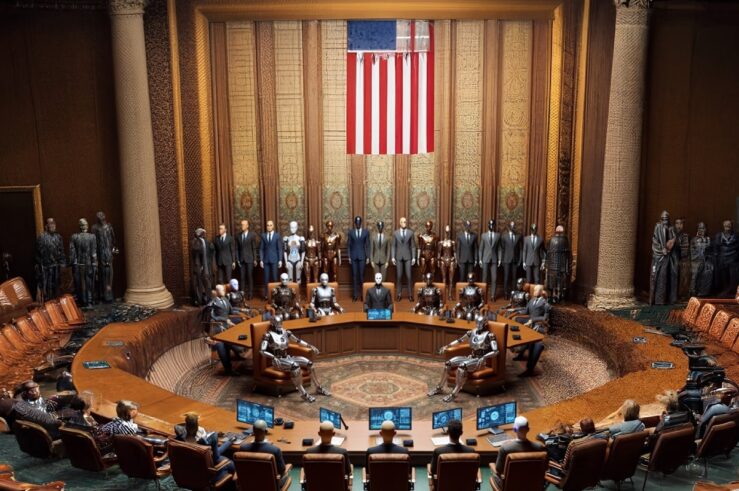U of Chicago Law Professors Douglas Baird and M. Todd Henderson (my very smart, very tall law school classmate) recently posted a provocative paper on SSRN. The paper, Other People’s Money, contends that “the oft-repeated maxim that directors of a corporation owe a fiduciary duty to the shareholders” is an “almost-right principle that has distorted much of the thinking about corporate law in recent decades.” Baird and Henderson argue that we should scrap this “almost-right” but mischief-causing principle in favor of a principle that would ground duties to all investors in contract.
Given innovations in corporate finance, the lines among shareholders, debtholders, and creditors have become quite blurred. Accordingly, Baird and Henderson argue, “[i]dentifying only shareholders as investors, as opposed to all providers of capital, is misleading.” Moreover, giving common stockholders the most privileged spot in the pecking order, as the notion of fiduciary duties owed to shareholders seems to do, may be inappropriate. How, for example, could the directors of a distressed corporation ever file for bankruptcy, thereby harming shareholders at the expense of creditors? Baird and Henderson argue that theorists committed to “the sacred cow that the duty of the directors is owed solely to the shareholders” have “paint[ed] themselves into embarrassing corners” trying to address the filing of a bankruptcy petition and other situations where shareholder interests seem appropriately subordinate to those of other capital providers.
If we are to jettison the notion that fiduciary duties are owed to shareholders, what principle should replace it? The most obvious candidate, Baird and Henderson observe, would be a rule that “directors must adopt the course that, in their judgment, maximizes the value of the firm as a whole.” (And a strong business judgment rule would apply to directors’ decisions.) Under this approach, which resembles the approach Judge Easterbrook took in In re Central Ice Cream Co., 836 F.2d 1068 (7th Cir. 1987), “claims by one class of investor against another alleging breach of fiduciary duty would fail so long as the directors acted reasonably to enhance firm value.”
But Baird and Henderson maintain that this “maximize the value of the enterprise” approach is also deficient. In particular, it fails to account for common situations in which senior investors, such as venture capitalists who own preferred stock with voting rights, bargain for the right to “pull the plug” on a venture — even though doing so would leave common stockholders with nothing and wouldn’t maximize the value of the firm ex post. Such arrangements, Baird and Henderson argue, may be value-maximizing ex ante because they give managers (generally junior claimants) an incentive to manage well. But, of course, the provisions can’t have this value-enhancing effect if they can’t be enforced due to a fiduciary duty running to common stockholders. Baird and Henderson thus argue that courts shouldn’t “stand in the way” of this “contracting regularity.” Instead, courts should honor contracts among directors and capital providers — even those that would disadvantage common stockholders.
In all, a terrific paper. It’s consistent with my view (explained in detail here) that the contracts between corporate constituents should be freely tailorable by the parties, and with my argument (set forth in the last part of this paper) that fiduciary duties should not preclude corporations from authorizing certain forms of insider trading.
My only quibble with the paper is that it seems to suggest in a couple of places that we should junk altogether the notion of fiduciary duties owed to shareholders. (See, e.g., page 8: “Hence, it may make sense to eliminate the concept of fiduciary duty from corporate law altogether.”) I wouldn’t go that far. Fiduciary duties running to shareholders exist because the cost of drafting contracts that would expressly state the constraints on managers’ conduct is simply too great. Because managers and shareholders can’t envision all the various contingencies that will arise, decide up front how those issues should be resolved, and memorialize those decisions in an express contract, the law polices manager conduct by positing amorphous duties of diligence and loyalty — duties whose precise content is fleshed out ex post. As Easterbrook and Fischel put it, “The only promise that makes sense in such an open-ended relation [as that between managers and shareholders] is to work hard and honestly.” The fact is, we need fiduciary duties running to shareholders to act as contractual gap fillers; we shouldn’t jettison them altogether.
That said, we should recognize that fiduciary duties owed to shareholders are nothing more than contractual gap-fillers. That is, they are contract terms that exist absent some provision to the contrary. Thus, to quote Easterbrook and Fischel again, “Because the fiduciary principle is a rule for completing incomplete bargains in a contractual structure, it makes little sense to say that ‘fiduciary duties’ trump actual contracts.”
If fiduciary duties are so construed, the concern that animates Baird and Hnderson becomes easy to remedy. Suppose a corporate charter were to include some provision stating that fiduciary duties to shareholders shall not be violated by executing or performing contracts with other capital providers as long as those contracts were in the best interests of the firm, measured from the perspective of the ex ante bargain among investors. The fiduciary duties owed shareholders — important contractual terms in the bargain between shareholders and managers — would still exist but wouldn’t be violated by actions authorized by contracts with other capital providers. This, I think, is a better outcome than scrapping altogether the notion of fiduciary duties running to shareholders.
Despite some language that might suggest otherwise, I believe this is the outcome Baird and Henderson are ultimately advocating. The penultimate paragraph of the paper suggests as much:
Board decisions should follow control rights, wherever and in whatever form they are manifest, and courts should largely get out of the way. This means courts should refuse to give creditors fiduciary duties (say in the zone of insolvency), refuse to allow shareholders to use fiduciary duties as a mechanism for upsetting director decisions that increase firm value or are conceivably part of the investors’ ex ante bargain, and refuse to perpetuate the inefficient link between disclosure and fidicuary duties. Directors should take from court decisions the simple maxim that they should do what is in the best interest of the firm, measured from the perspective of the ex ante bargain among investors. This will mean maximizing the firm value in nearly every case, but…sometimes acting in ways that seem selfish but are really just efficient and, when viewed ex ante, value-maximizing.




